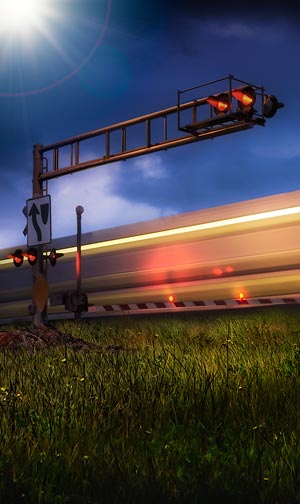Muncie Medical Professionals Urge Halt to Planned CSX Train Speed Increase
(December 16, 2012)
Two high-ranking Delaware County, IN emergency trauma medical officials had their “Letter to the Editor” published in the Editorial Section of Sunday’s edition of the Muncie Star-Press, offering their opinions of CSX railroad’s planned increase in train speeds through Muncie, IN from the current 30 mph to 60 mph effective January 1, 2013.
Trauma Medical Director Mark Saleem of the Indiana University Ball Memorial Hospital and Jan Kornilow, Director of Emergency Medical Services and himself an emergency medical physician, spoke from both research and experience in urging support of Mayor Dennis Tyler’s fight to enforce Muncie’s train speed ordinance, which limits trains traveling through Muncie to 40 mph.
”As the trauma medical director at Indiana University Health Ball Memorial Hospital and emergency medical physician, we can tell you that the speed increase is an exceptionally bad idea,” wrote the two well-respected doctors. “The likelihood you will die as a result of a train-related accident will rise significantly if this happens.”
CSX claimed federal exemption from local regulations when Mayor Tyler, whom CSX never bothered to inform about the planned doubling of train speeds through Muncie, had vowed to have the city’s legal counsel force CSX to abide by the 40 mph limit. And in talking with Federal Railroad Administration officials, the two physicians learned that “the Federal Railroad Administration was also unaware of the CSX plan to increase speed.”
In further discussion with the FRA, Drs. Saleem and Kornilow were given “Reasons cited for the (current) 30 mph speed selected for Muncie specifically included the number of graded crossings (where roads cross train tracks) as well as the number of ‘interlocking’ tracks (where tracks of different railroad companies cross paths)”
“Indiana has the distinction of having one of the highest rates of train crashes in the nation,” said the jointly-signed letter. “When trains go faster, death is more likely. This is supported not only by common sense, but also (by) the Federal Railroad Administration’s Safety Statistics annual report.”
“Fatality of train accidents is directly correlated with ‘consist’ speed. Also, the faster the train is traveling, the harder it is on the condition of the tracks, increasing maintenance needs and likelihood of malfunction,” the letter continued.
“Another major concern is the possibility of a mass casualty disaster involving hazardous materials,” noted the letter. “CSX trains transport a large volume of hazardous materials through our town on a regular basis.”
“Don’t be fooled by reasoning you may hear for the increase in speed such as shorter wait times for railway crossings,” warned the doctors. “The real reason is simple. Time is money. Going faster means less time and less cost for CSX. Unfortunately, we will pay the cost with the lives of our loved ones,” the physicians predicted.
Calling the FRA’s Safety Statistics Annual Report a “sobering report,” the writers encouraged both that the residents of Muncie take advantage of the availability of the publication online, as well as to “reach out to Mayor Tyler’s office for support and advice on how to help avert this impending disaster.”


